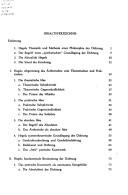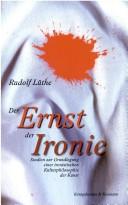| Listing 1 - 10 of 216 | << page >> |
Sort by
|
Book
ISBN: 1501321501 150132151X 1501321498 Year: 2016 Publisher: New York : Bloomsbury Academic,
Abstract | Keywords | Export | Availability | Bookmark
 Loading...
Loading...Choose an application
- Reference Manager
- EndNote
- RefWorks (Direct export to RefWorks)
"German Aesthetics provides English-speaking audiences with accessible explanations of fundamental concepts from the German tradition of philosophical aesthetics. Organized with the understanding that aesthetic concepts are often highly contested intellectual territory, and that the usage and meanings of terms often shift within historical, cultural, and political debates, this volume brings together scholars of German literature, philosophy, film studies, musicology, and history to provide informative and creative interpretations of German aesthetics that will be useful to students and scholars alike."--Bloomsbury Publishing.
Book
ISBN: 9783846745793 9783770545797 3846745790 Year: 2008 Publisher: Paderborn : Wilhelm Fink Verlag,
Abstract | Keywords | Export | Availability | Bookmark
 Loading...
Loading...Choose an application
- Reference Manager
- EndNote
- RefWorks (Direct export to RefWorks)
Oberfläche’ ist in der Ästhetik der Moderne mehrdeutig und ambivalent codiert. Die Untersuchung verfolgt die theoriegeschichtliche Karriere des umstrittenen Begriffs zwischen Archi-tektur und Literatur in der Goethezeit und im Historismus. Durch den Materialisierungsschub im industriellen Zeitalter werden Oberflä-chen zunächst in den technischen Künsten zum theoretischen Traktan-dum. Die Lösungen, die namentlich die Architekturtheorie für das Problem ‚Oberfläche’ findet, inspirieren dann auch die Theorie der schönen Künste. Die Studie untersucht diese komplexen Austauschprozesse zwischen Literatur und Architektur in exemplarischen Detailanalysen am Werk von K. F. Schinkel, Goethe, G. Semper und F. Th. Vischer.
Facades. --- Architecture --- Aesthetics, German --- Aesthetics, German --- Philosophy.
Book
ISBN: 9780199694655 0199694656 1282383299 9786612383298 0191572373 0199573018 0191722200 Year: 2011 Publisher: Oxford: Oxford university press,
Abstract | Keywords | Export | Availability | Bookmark
 Loading...
Loading...Choose an application
- Reference Manager
- EndNote
- RefWorks (Direct export to RefWorks)
Diotima's Children is a re-examination of the rationalist tradition of aesthetics which prevailed in Germany in the late seventeenth and eighteenth century. It is partly an historical survey of the central figures and themes of this tradition But it is also a philosophical defense of some of its leading ideas, viz., that beauty plays an integral role in life, that aesthetic pleasure is the perception of perfection, that aesthetic rules are inevitable and valuable. It shows that the criticisms of Kant and Nietzsche of this tradition are largely unfounded. The rationalist tradition deserves re-examination because it is of great historical significance, marking the beginning of modern aesthetics, art criticism, and art history.
Aesthetics, German --- Rationalism. --- Aesthetics, German. --- 1600-1799. --- Rationalism --- Aesthetics, German - 17th century --- Aesthetics, German - 18th century
Book
ISBN: 9780719040115 0719040116 Year: 1993 Publisher: Manchester: Manchester University press,
Abstract | Keywords | Export | Availability | Bookmark
 Loading...
Loading...Choose an application
- Reference Manager
- EndNote
- RefWorks (Direct export to RefWorks)

ISBN: 3416009703 Year: 1974 Publisher: Bonn : Bouvier,
Abstract | Keywords | Export | Availability | Bookmark
 Loading...
Loading...Choose an application
- Reference Manager
- EndNote
- RefWorks (Direct export to RefWorks)
Book
ISBN: 0520301374 9780520301375 Year: 2018 Publisher: Berkeley, CA : University of California Press,
Abstract | Keywords | Export | Availability | Bookmark
 Loading...
Loading...Choose an application
- Reference Manager
- EndNote
- RefWorks (Direct export to RefWorks)

ISBN: 3826023803 Year: 2002 Publisher: Würzburg Königshausen und Neumann
Abstract | Keywords | Export | Availability | Bookmark
 Loading...
Loading...Choose an application
- Reference Manager
- EndNote
- RefWorks (Direct export to RefWorks)
Aesthetics, German --- Arts --- Philosophy
Book
ISBN: 3518293222 Year: 2004 Publisher: Frankfurt am Main Suhrkamp
Abstract | Keywords | Export | Availability | Bookmark
 Loading...
Loading...Choose an application
- Reference Manager
- EndNote
- RefWorks (Direct export to RefWorks)
Aesthetics, German --- Art --- Philosophy
Book
Year: 1974 Publisher: Bern : Frankfurt/M. : Herbert Lang ; Peter Lang,
Abstract | Keywords | Export | Availability | Bookmark
 Loading...
Loading...Choose an application
- Reference Manager
- EndNote
- RefWorks (Direct export to RefWorks)
Book
ISBN: 9789004654679 9789051839890 9004654674 Year: 1996 Publisher: Boston : BRILL,
Abstract | Keywords | Export | Availability | Bookmark
 Loading...
Loading...Choose an application
- Reference Manager
- EndNote
- RefWorks (Direct export to RefWorks)
This study explores Heinrich Böll's 'aesthetic thinking', as it is expressed in the author's disparate and voluminous writings on literature. Böll's work in this field is situated in the multi-faceted context of social, political, and cultural developments in post-war Germany, and is shown to be an important adjunct to the novels and stories which were honoured with the Nobel Prize for Literature. An understanding of Heinrich Böll's 'aesthetic thinking' can illuminate the writer's fiction in an intriguing way. In particular, Böll's defence of the 'rationality of poetry' raises issues which reverberate in continuing debates on the social validity of literature.
| Listing 1 - 10 of 216 | << page >> |
Sort by
|

 Search
Search Feedback
Feedback About UniCat
About UniCat  Help
Help News
News